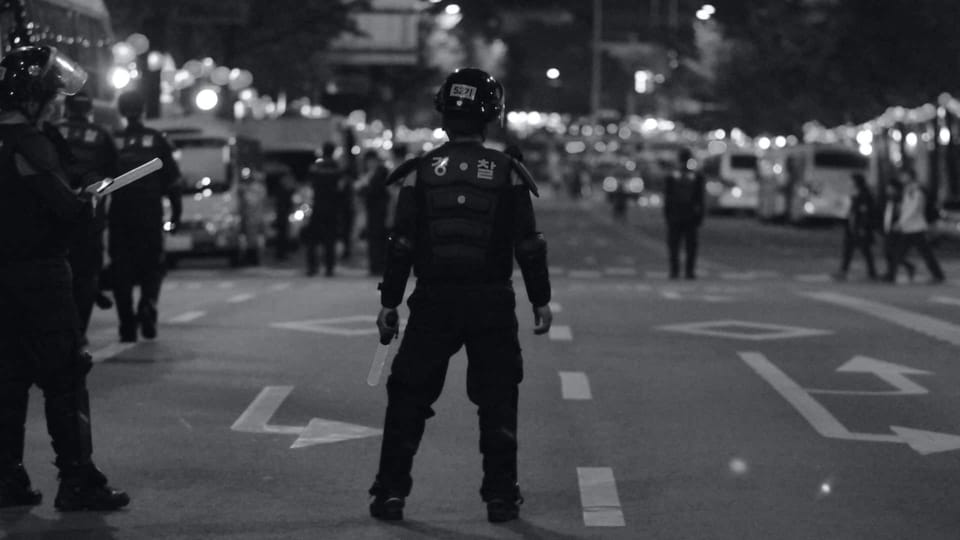Our Plan in a World Gone Mad (2 Timothy 2:1-3)

Big Idea: The world needs people who are strengthened by grace, who pass this good news on to others, and who take their stand with Jesus.
It has been a very difficult week for a lot of us. Serious issues have risen to the surface that leave us confused, concerned, angry, and overwhelmed. It is right to be asking serious questions about how we got here and how we should respond.
Let me be clear. The Bible speaks to the issues we’re facing right now. Humans are made in the image of God (Genesis 1:26-27), and God punishes injustice and mistreatment (Proverbs 22:8) and helps the oppressed (Psalm 146:7). It speaks clearly about our responsibility to love our neighbors — all of them. This is not an issue of the left or the right. This is a biblical issue. Because the Bible speaks clearly, we must too. There is no room for ambiguity. Our voices matter. We must speak clearly and loudly about what the Bible says, and stand with those who are being unjustly mistreated. Proverbs 31 says:
Open your mouth for the mute,
for the rights of all who are destitute.
Open your mouth, judge righteously,
defend the rights of the poor and needy.
(Proverbs 31:8-9)
Now is a good time to reflect on our own sinful attitudes towards others, speak out against evil, and condemn the systems that perpetuate it. It’s a good time to work for reconciliation and extend love to our neighbors. Now is a great time to listen to others, especially those whose voices we may not have heard before, especially those who are shaped by Scripture. It’s a good time to take a learning posture, to search Scripture, examine our hearts, and look for effective ways to take action.
But there’s something else we should do. It’s not going to look like much, but it is.
The Mess in Paul’s World
When Paul wrote the letter we’re looking at, the world was a mess. It always is! Sometimes things are simply clearer. Read about Paul’s life in Acts, and you realize he knew a few things about riots. Women were second-class. Slavery existed — a different kind of slavery than what we’re used to, but it was still slavery. When a baby was born, you could kill or throw the newborn on a dung heap or at the dump if you wanted. Amphitheaters featured bloody combats as entertainment: man against man, man against animal, and animal against animal. Executions were not seen as a form of entertainment, so they were scheduled during the lunch break. There were some good things about Roman society, but it was also a society of injustice, immorality, and brutality.
As Paul writes this letter, he’s about to die at the hands of Nero, one of the most unjust emperors who ever lived. He’s in prison. Nero was a man who murdered his mother, his first wife, and allegedly his second wife. It’s alleged that he started the great fire of Rome in A.D. 64 so he could rebuild the city-center, and then he blamed it on Christians. Tradition says that, shortly after Paul wrote this letter, Nero had Paul decapitated. When Nero eventually lost support, he killed himself. His dying words were, “What an artist dies in me!”
Our Agenda
What was Paul’s agenda in the middle of this immorality and injustice?
You then, my child, be strengthened by the grace that is in Christ Jesus, and what you have heard from me in the presence of many witnesses entrust to faithful men, who will be able to teach others also. Share in suffering as a good soldier of Christ Jesus. (2 Timothy 2:1-3)
There are three commands that are very timely for us today. These are not just survival skills, but they’re a plan to change a world that sorely needs to be changed.
1. Be strengthened by the grace that’s in Christ Jesus.
“You then, my child, be strengthened by the grace that is in Christ Jesus…” (2 Timothy 2:1).
If we’re going to survive what we just talked about — the injustice and brutality of this world, not to mention the ordinary garden-variety sufferings we face — this is a must. Be strengthened by the grace that’s in Christ Jesus.
You have one of two options right now.
- Option one: Pull out your phone. Open the news or social media. Scroll. I promise you will not be strengthened. I’m not saying it’s wrong to be on the news or on social media. What I’m saying is that it won’t give you what you’re looking for. It won’t fortify you for the challenges of our day. It won’t prepare you for what God is calling you to be and do.
- Option two: Be strengthened by the grace that’s in Christ Jesus. Think about who God is and what he has done. Think about the God who endued each person with dignity — each person, fearfully and wonderfully made, precious in his sight. Marvel that Jesus entered into the world of brokenness and pain, proclaiming good news, bearing our sins, defeating death and evil, and announcing his kingdom in which there will be no injustice or evil. Think about how this affects you: that his grace and kindness are available to you; what Jesus has done to have a relationship with you; how loved you are in Jesus Christ.
We need be strengthened by the grace that’s in Jesus any day. But the worse things get, the more this world discourages and defeats us, the more we need to be strengthened by this grace. The command in this passage is continual: on an ongoing basis, keep being strengthened by the grace that’s in Christ Jesus.
Where are you going to get the resources to make it through the challenges of life? There’s only one place you can get these resources that will not let you down. Keep coming back to Jesus, the inexhaustible supply of grace for those who need it most. Meditate on it. For every time you look at this world or yourself, take ten looks at Jesus. Feel the importance of this command. We need it!
But that’s not all.
2. Entrust the good news to others
“…and what you have heard from me in the presence of many witnesses entrust to faithful men, who will be able to teach others also” (2 Timothy 2:2).
It’s interesting that in a world of social issues, neither Jesus or Paul seemed to address them directly. Why is this? Did Jesus not care about issues like slavery, racism, infanticide, or the other issues of their day?
Of course they did. Both Paul and Jesus were Scriptural, and affirmed what the Bible teaches on all of these issues.
So why didn’t they address these issues? They did. Take Paul. Paul planted seeds in his books — particularly in the book of Philemon — not through a frontal attack, but by undermining it with the gospel. Paul knows that if he spreads the gospel, and teaches people what the gospel means, that it will create men and women who realize that the gospel is incompatible with slavery or racism or infanticide. There’s room for a frontal attack, but there’s also room to take a different approach: to see that what this world needs most are more people who are changed by the gospel, and because they are changed by the gospel they stop participating in systems of injustice.
That’s what happened in the Roman world. People believed the gospel and joined churches. In those churches, masters and slaves became fellow believers. Women were no longer second class but fellow heirs in Jesus. Ethnic and racial prejudices were erased. As the gospel spread throughout the Roman world, little communities were planted that undermined injustice, sexism, and racism in the world. Early Christians stood in opposition to infanticide, the degradation of women, gladiatorial combats, slavery, and more.
Historian Rodney Stark says:
Christianity revitalized life in Greco-Roman cities by providing new norms and new kinds of social relationships able to cope with many urgent urban problems. To cities filled with the homeless and the impoverished, Christianity offered charity as well as hope. To cities filled with newcomers and strangers, Christianity offered an immediate basis for attachments. To cities filled with orphans and widows, Christianity provided a new and expanded sense of family. To cities torn by violent ethnic strife, Christianity offered a new basis for social solidarity. And to cities faced with epidemics, fires, and earthquakes, Christianity offered effective nursing services.
I was almost going to change the message this week until I realized that this is exactly what we need.
Things don’t truly change from a political revolution or legislation. Things change when people are changed by God. We can’t just deal with behavior. We have to deal with the roots. We have to deal with the heart. “Social renewal is the fruit and byproduct of the regenerating work of the Holy Spirit starting in individuals but coming to expression in the redeemed community, the body of Christ” (John Bolt).
What’s one of the best ways to fight injustice? Spread the gospel. Do what Paul says in verse 2: entrust the gospel to others who will entrust it to others. Give what’s been given to you to others.
Again, this is not because Paul doesn’t care about social issues.
There is a “given” about the Christian faith; it is something inherited from the very beginning of God’s action for our salvation, and it is to be passed on as long as this world lasts. Paul is not arguing that believers should be insensitive to currents of thought and action in the world about them… He is saying that there is that about the essence of the Christian faith that is not open to negotiation. God has said and done certain things, and Christians must stand by those things whatever the cost. (An Introduction to the New Testament)
John Perkins, a pastor and civil rights activist, believes the church is the best place for racial reconciliation. He writes: “There is no institution more equipped and capable of bringing transformation to the cause of reconciliation than the church. But we have some hard work to do.”
Paul’s command to Timothy is relevant in this needy age. It’s crucial. We’re called to be part of this chain: to receive the gospel and pass it on to other faithful men and women who can then pass it on to others.
Be strengthened in Jesus; entrust the good news to others; and there’s one more thing.
3 .Share in suffering
“Share in suffering as a good soldier of Christ Jesus” (2 Timothy 2:3)
We’ll return to this next week, so I’ll just mention it now. If you think the Christian life is going to be easy, you’re mistaken. You’re enlisting in war. You have one goal once you start following Jesus: to be faithful to your Lord no matter what the cost. And there will be a cost. “Every morning we ought to wake up and say to ourselves, ’There is a vicious, dark, spiritual battle being waged over me today.’ Satan is very busy…” (Christopher Ash).
The soldier is full often a suffering man. There are wounds, there are toils, there are frequent lyings in the hospitals, there may be ghastly cuts which let the soul out with the blood. Such the Christian soldier must be, ready to suffer, enduring hardness, not looking for pleasure of a worldly kind in this life, but counting it his pleasure to renounce his pleasure for Christ’s sake. (C.H. Spurgeon)
May I suggest that the world needs people who are strengthened by grace, who pass this good news on to others, and who take their stand with Jesus no matter what the cost. How might society be changed if we do this?
Matthew Waterman, a recent graduate of Wycliffe here in Toronto, writes this:
My brief experience of pastoral ministry (and life as a Christian) has shown me that Christians live up to their gifting and calling only a fraction of the time and can look almost identical to the world the rest of the time. But the hope I have that energizes me is the endurance and encouragement of the Scriptures…
Promises from leaders that they will do better, rash character assassinations, joining ranks with the dissipated and wrathful hordes will all peter out, because their fuel is human anger, which does not produce God’s righteousness, and fear, which is a deficient experience of God’s love.
…the words that encourage me most in ministry are Ephesians 4:13 “Until we all reach unity in the faith and in the knowledge of God’s Son, growing into maturity with a stature measured by Christ’s fullness.” Honestly, I don’t believe that has or ever will happen in a congregation; but the word “until” means we never stop speaking the truth, repenting, learning, and praying until there is progress, and the words “we all” mean that we are all on the same side and we do this as a family.
And that’s basically what I believe the church has to offer, on a structural level, to the present situation, and I think it’s worth giving our lives to this. There are obviously specific issues that need to be dealt with, but there must be relationship first, and that to me is the church of Jesus Christ.
Lord, help us. It’s so clear that we need you. What will change this world? Only you can. And you are doing that right now by changing individuals who join communities that are outposts of your kingdom.
So help us respond to what Jesus has done for us. Help us to never get over that. If anyone on this call has not yet done so, may they receive the gift of grace that’s found in Jesus by turning to him with the empty hands of faith. And may all of us be strengthened by it on an ongoing basis.
And help us to spread this good news to others. And help us to take our stand with Jesus, aiming only to please him, no matter what the cost. And we pray that outposts of your kingdom will point to our world’s only hope. In Christ’s name, Amen.





